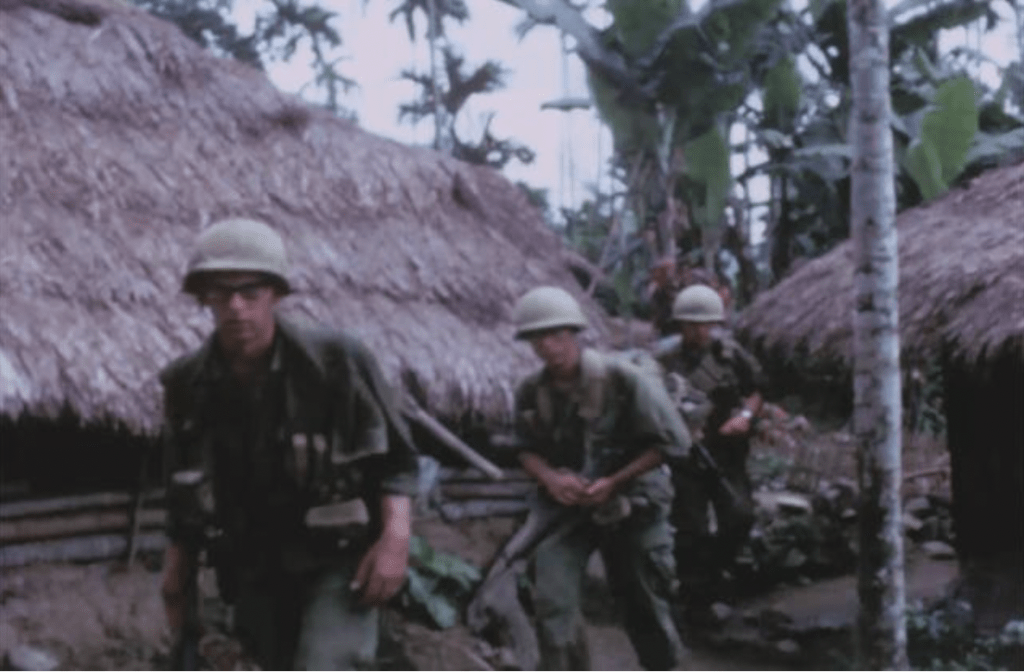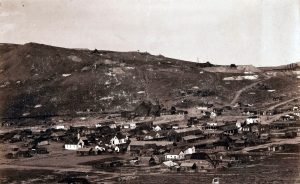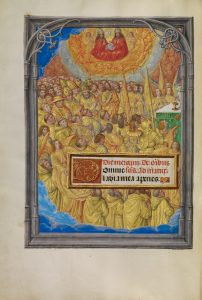Former First Class (FPFC) Robert M. Storeby was just like most men in the United States. He was proud of joining the army to contribute to his country as a way of showing gratitude. However, he did not know what was waiting for him. The reality that Storeby saw was one he wished that he could not remember. Born and raised in northwestern Minnesota to a family that struggled to get along, Storeby was fascinated by the landscape of the Asian country. Storeby traveled across the world to fight in a country where everything was underdeveloped and nearly destroyed after a previous war against the French. However, the scenes of the flourishing paddy fields, intertwined tropical jungles, and imprisoning patches of high elephant grass, were different from the frosted pastures of his hometown, of which he was used to. As an infantryman, Storeby had seen a considerable amount of operations; therefore, if he could choose, he would rather remember about the time he was pinned down, and half of his unit was injured. Nonetheless, the image of a Vietnamese village woman never once left his mind. She was twenty years old at the time, and came from a remote hamlet of Cat Tuong, in Phu My District, which was about a few miles west of the South China Sea.1

On November 17, 1966, one day before a reconnaissance was to take place in a small village, Storeby and two other squad members, Cipriano S. Garcia and Joseph C. Garcia, were told by Sergeant David Edward Gervase and Private First Class, Steven Cabbot Thomas, who were both members of C Company, 2nd Battalion, 8th Cavalry, and 1st Cavalry Division, that they planned to kidnap a blossoming, charming girl during the upcoming reconnoitering mission, and at the end of the fifth day, they would kill her.2 He recalled that Gervase insisted that it would be “good for the morale of the squad.”3 Storeby had not been on the same page with them from the beginning. Though he could do nothing about it, he did not get involved in the crime. However, he did report the incident to a commander.
At exactly 5:00 a.m on November 18, 1966, a few hours before the reconnaissance mission happened, they began to mission that the Lieutenant described as “extremely dangerous.”4 Five commissioned men, including Storeby, went on a counterespionage mission in a tiny rustic village looking for their target. The men were approaching the town, and Storeby was cursing himself for having agreed to go along with his comrades. In distrust and confusion, his heart pounded rapidly as the adrenaline ran through his veins. He saw that Thomas did not lose a second in carrying out his plan. With Garcia following him, the Sergeant had commenced a well-organized hunt through the hamlet. He had not found a single girl from five or six cottages that they raided. Then Joseph spotted a white hut and shouted, “There’s a pretty girl in there! She has a gold tooth!” Immediately, Gervase said, “That’s the girl we’ll find.”5 Storeby remembered that the unit then quickened their steps to jerk her from the hut where she was sleeping with her family.6 They then used a rope to bind and gag her and took her on duty.

Storeby did not remember much about the girl’s looks; however, he did remember that she had a “bodacious gold tooth and that her eyes were purely dark brown, and could be significantly sententious”.7 Like most bucolic women, she dressed in traditional loose-fitting black pajamas called “áo bà ba.” He knew her for only twenty-four hours before she was stabbed three times then shot in the head, which ultimately led to her death. They were the last people that she ever saw. For the time she had lived, Storeby hardly exchanged a word with her, since neither of them spoke the other’s languages. He did not know her name at that time; it wasn’t until her sister identified her in a court-martial proceeding that he eventually learned her name—Phan Thi Mao—the name that would, later on, shadow him for the rest of his life.8
Leaving the hamlet with the girl as their prize, the squad moved west toward the main tracks. There was a cry of agony that ceased them when they hardly had departed twenty meters away from the village. It was Mao’s mother, Storeby recalled, who was chasing them with the hope of begging them to release her daughter. One of the members testified at the court, “The mother came out, like they always do, started crying, talking. We just tell them to dee dee (đi đi)”- meaning to go away.9 Having reminisced about the scenery, Storeby remembered noticing an austere woman waving her scarf, which is known by the Vietnamese as “khăn rằng.” She thrust herself toward them in great desperation. Ultimately, she reached them, talking in her panting that the scarf was Mao’s and that she would like Mao to have it with her; she was prostrated with tears flowing down her cheeks. Perchance, from deep down, the mother realized that she would never see her innocent, naive child again. The situation was incommodious, Storeby recalled. Having received the scarf, Thomas spread a smile across his face, and Stroreby was conscious of his intention. Just then, Thomas used the scarf to stuff her mouth to prevent her from yelling for help. Later on that day, after settling down in a forsaken hovel, and having a wholesome snack outside the hootch, Gervase looked at his fellow man as if he was up to something, and said that “It’s time to have some fun.”10
Sensing Storeby’s disapproval, the Sergeant confronted him, wanting to know whether he would go into the hut with him or not. Storeby shook his head. Thomas warned him that he was in danger of being reported as “a friendly casualty” for not joining them in a horrible crime. Still, he shook his head. Thomas did not give up. He tried to attack Storeby’s masculinity by calling him “queer” and “chicken.”11 Despite his effort, Storeby still gave him a solid, firm no.

The Sergeant was the first who went into the hut, and soon after Storeby heard a pitchy, painful moaning coming from inside the hootch. Storeby deeply felt sorry for the girl; a young virgin that went through so much pain. The sound of her sobbing kept repeating as the other four soldiers kept molesting her. Storeby was outside at that time; he could not do anything but feel sorry for the girl. Having satisfied their desires, the others took off and left Storeby alone to guard her and their weapons. Storeby then said that “even though they were two different people, speaking two different languages, and that he could not understand her back then, somehow, there was a connection between them. He felt like he knew her well enough, her futile cries in the latency on the hill 192”.12 He did not know how to act around her, how to behave.13
After thinking, Storeby decided to go into the hutch to check on her. He said, “When Mao saw me come into the hootch, she thought I was there to rape her. She began to weep, and backed away, cringing.”14 He noticed that Mao was very jaded and ill, and she seemed to get worse as time went by. He had a feeling that Mao was injured; however, he did not know for sure because she was covered by her black pajamas. The soldier gave her crackers, water, and beef stew—it was her first meal since she was kidnapped from her home. Storeby remembered that she kept staring at him with her wary doubtful eyes as if she was trying to figure out what game he was playing with her. Mao then hardly mumbled something that Storeby guessed was “Thank you.”15 Storeby wanted to tell her that he was sorry for his fellow men’s act, for their horrible crimes, yet the language barrier made that very difficult. He wished he and she could communicate, so that Mao could tell him what she wanted, because, after all, it is her life that is in danger, not his. Storeby stepped outside to be by himself. It was then that he started to have all the conflicts in his consciousness. He was in two minds as if he should let her flee or keep her there. Little did he know that his members were then four hundred meters away, on the Hill 192, and it would take them about an hour to return back to the hut. He had the chance to rescue the girl, to save this person’s life, yet as a self-restrained soldier, he could not use the excuse that she overpowered him. He felt powerless.
The night went by. In the morning, they woke up shortly after six. It was then that he knew what would happen to Mao. They were about to kill her and report it as a K.I.A- Killed in action.16 However, it was then that they were attacked by the Viet Cong. In the middle of the firefight with communist Viet Cong, for fear that she would be seen with the squad, Thomas took her to a secluded area and without hesitation or mercy, he stabbed her three times. Despite her being stabbed, she was still alive. She then tried to flee from them in spite of knowing her chance of surviving was small. Thomas finally caught her and cold-bloodedly shot her in the head with his M16 rifle.17 The event happened so fast that Storeby had not been fully aware of the situation.
Having found out that they killed Mao in this way, he began to have guilty feelings that urged him to take actions against them, to make them pay for what they did. With that in mind, Storeby went up to the chain of command, to the captain. However, he turned a blind eye on the horrendous act that was committed by the American soldiers. Storeby then was threatened by those who had been involved in the crime. They threatened to kill him; however, he still insisted on reporting their crime to higher authorities. His effort paid off, as a court-martial took place in Viet Nam. The army had to fly the judge, whose name was Durbin, all the way from America. It was at the court that Mao’s sister, Loc, identified her sister’s body, and it was there that Storeby testified to the whole story. It was then that the ugly truth of war was revealed internationally. The court ended with Thomas being sentenced to prison for life despite the prosecutor’s proposal that he should have received the death penalty. Gervase was sentenced for ten years, Joseph Garcia received fifteen years in jails, and Cipriano had four years of confinement.18 Consequently, four of them were dishonorably discharged from the Army.
Even though Storeby’s fellow men were sentenced to prison, his life was still in danger. This led to him being placed in the witness protection program. It was not until Daniel Lang published a book about the story that the world was made known of the incident. Twenty years after the trial, the court-martial, and the story of Storeby and Phan Thi Mao, the Columbia Pictures company was inspired to produce the movie Casualties of War.19
- Daniel Lang, “Casualties of War,” New Yorker 45 no. 41 (1969), https://www.newyorker.com/magazine/1969/10/18/casualties-of-war. ↵
- Frederic L. Borch III, Judge Advocates in Vietnam: Army Lawyers in Southeast Asia 1959-1975 (Darby PA: DIANE Publishing CO., 2003), 71. ↵
- Daniel Lang, “Casualties of War,” New Yorker 45 no. 41 (1969): https://www.newyorker.com/magazine/1969/10/18/casualties-of-war ↵
- Daniel Lang, “Casualties of War,” New Yorker 45 no. 41 (1969): https://www.newyorker.com/magazine/1969/10/18/casualties-of-war. ↵
- Daniel Lang, “Casualties of War,” New Yorker 45 no. 41 (1969): https://www.newyorker.com/magazine/1969/10/18/casualties-of-war. ↵
- Tom Fitzpatrick, “There is yet more to Casualties of War,” Phoenix New Times, August 30, 1969. ↵
- Daniel Lang, “Casualties of War,” New Yorker 45 no. 41 (1969): https://www.newyorker.com/magazine/1969/10/18/casualties-of-war. ↵
- Daniel Lang, “Casualties of War,”New Yorker 45 no. 41 (1969): https://www.newyorker.com/magazine/1969/10/18/casualties-of-war. ↵
- Daniel Lang, “Casualties of War,” New Yorker 45 no. 41 (1969): https://www.newyorker.com/magazine/1969/10/18/casualties-of-war. ↵
- Daniel Lang, “Casualties of War,” New Yorker 45 no. 41 (1969): https://www.newyorker.com/magazine/1969/10/18/casualties-of-war. ↵
- Daniel Lang, “Casualties of War,” New Yorker 45 no. 41 (1969): https://www.newyorker.com/magazine/1969/10/18/casualties-of-war. ↵
- Daniel Lang, “Casualties of War,” New Yorker 45 no. 41 (1969): https://www.newyorker.com/magazine/1969/10/18/casualties-of-war. ↵
- Daniel Lang, “Casualties of War,” New Yorker 45 no. 41 (1969): https://www.newyorker.com/magazine/1969/10/18/casualties-of-war. ↵
- Daniel Lang, “Casualties of War,” New Yorker 45 no. 41 (1969): https://www.newyorker.com/magazine/1969/10/18/casualties-of-war. ↵
- Daniel Lang, “Casualties of War,” New Yorker 45 no. 41 (1969): https://www.newyorker.com/magazine/1969/10/18/casualties-of-war. ↵
- Daniel Lang, “Casualties of War,” New Yorker 45 no. 41 (1969): https://www.newyorker.com/magazine/1969/10/18/casualties-of-war. ↵
- Frederic L. Borch III, Judge Advocates in Vietnam: Army Lawyers in Southeast Asia 1959-1975 (Darby PA: DIANE Publishing CO., 2003), 71. ↵
- Frederic L. Borch III, Judge Advocates in Vietnam: Army Lawyers in Southeast Asia 1959-1975 (Darby PA: DIANE Publishing CO., 2003), 71. ↵
- Frederic L. Borch III, Judge Advocates in Vietnam: Army Lawyers in Southeast Asia 1959-1975 (Darby PA: DIANE Publishing CO., 2003), 71. ↵



39 comments
Jose Chaman
It is really sad to know that these situations took place in Vietnam. This article helps to understand from a point of view very close to this event, what it felt like to have experienced that terrible catastrophe of war. Storeby could have stopped the incident, however we always fall under dogma. This article is really powerful when bringing this issue to the table, I hope that one day justice will be done to each person who suffered from these “casualties”.
Luis Jaen
In this article I think there is a very important lesson on standing up for what you believe in and persevering no matter how bad the situation gets. Storeby was put in a situation where he was tried by his own squadron, the people in war who are supposed to be his brothers. I have much respect for Storeby and I believe people should take away the importance of holding your ground for what one believes. Very graphic article but it truly captures the terrible acts of war, overall a great read.
Mike B.
This article is very barbaric, yet quite full of emotion. With Storeby being confronted with the difficult decision on whether or not to join in with his comrades in not only the rape of, but killing of young women in Vietnam. Storeby refused to conduct such heinous acts and instead opted to help Mao out as much as he could.Ultimately reporting his fellow soldiers after he found Mao murdered, and the commanders he was under had looked the other way. Having my grandfather serve in Vietnam and comparing his stories to this article gives me a true perspective as to the true brutality of the war, and the numerous war crimes committed against the people who called the jungle nation their home.
Sofia Almanzan
This article is very well written. I enjoyed how the story is told through the perspective of the soldier and was wondering where the author got this information. This shows the realities of “war” for those in countries where the fighting is literally in their backyard. This is a reality that many Americans today will never have to face. I also found interesting how it is situations such as these that give men in the military such bad reputations when it comes to rape as it is also common that many men in the military are victims of rape or sexual assault that goes unnoticed.
Ana Cravioto Herrero
This article was so well written and it really conveys the emotion that the victims felt as well as Storeby and I imagine other soldiers that did not feel comfortable with the acts. The stories were so sad and it is disappointing that the culture at that time, and even some of the culture currently in America today revolves around violence and pride. Although these stories are unbelievably depressing, it is vital that they are shared so that it brings awareness and so that history does not repeat.
Caily Torres
This article is very brutal yet heartfelt. Storeby was faced with the difficult decision on whether to join in with his fellow comrades to not only rape but kill young women in Vietnam. Storeby refused to partake in the crimes and instead decided to help Mao out as much as he could. Once Mao was murdered, he reported his comrades to a higher power because the captain in command decided to turn his head the other way. Justice was brought to Mao and Storeby’s story was shared internationally to show the ugly truth of this war.
Nelly Perez
Storeby had a good heart by not taking part in the crimes that were committed against young women. I can understand why he wanted to forget what he experienced in Vietnam. He felt the pressure to take part in the rape against Mao, but he decided to show kindness to her. He wanted to save her, but he knew that she would not be safe. He was right for reporting the men who took part to the court and higher ups because he knew that it was not right. His story got shared and it showed the ugly truth.
Yadira Chavez
I think that this story holds a very important lesson in fighting for what you believe in at any cost. Robert Storeby had several opportunities to step into the situation from a place of power, and help the girl to be saved, yet the soldier in him prevented him from making a life costing decision. This article is well written and showcases the torturous feelings someone can go through when they have to be a lone wolf and do something scary.